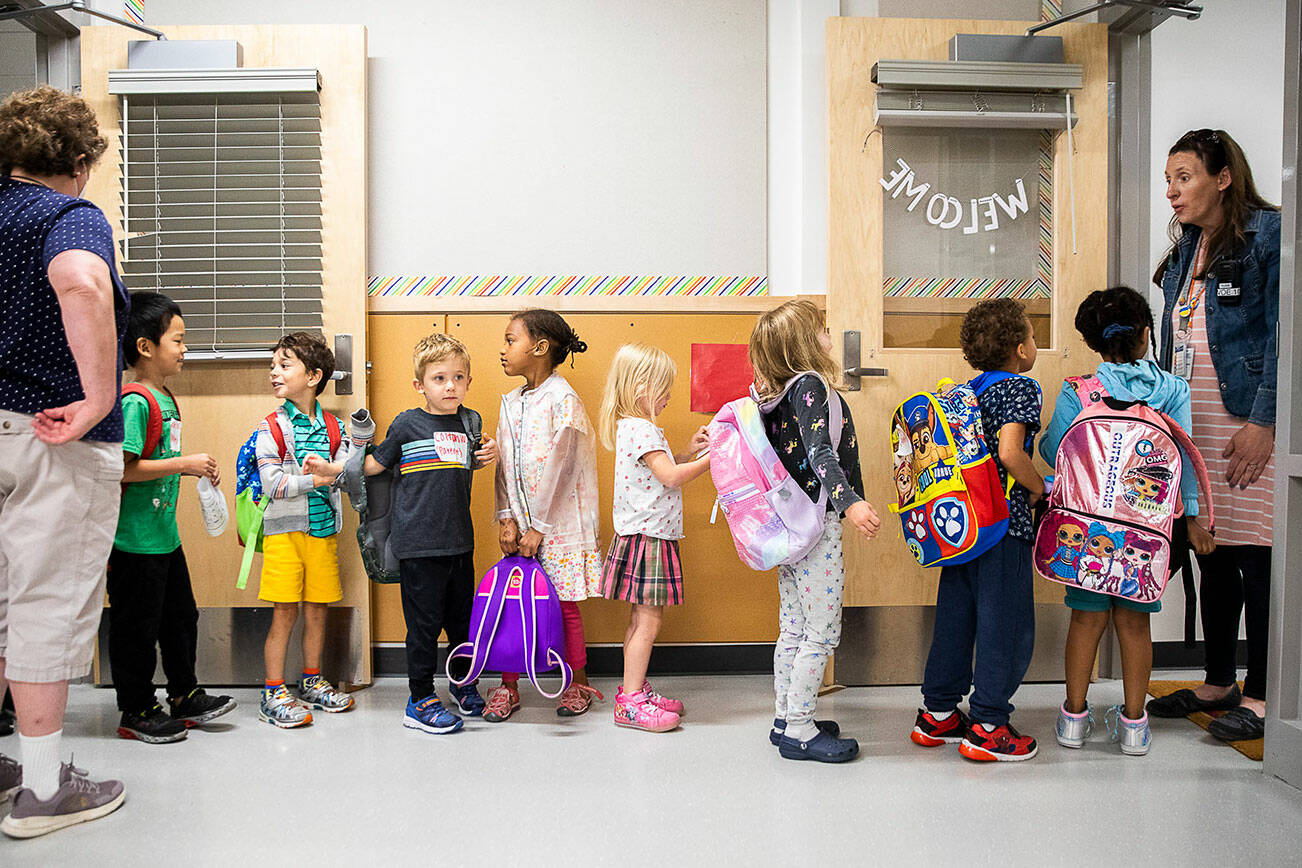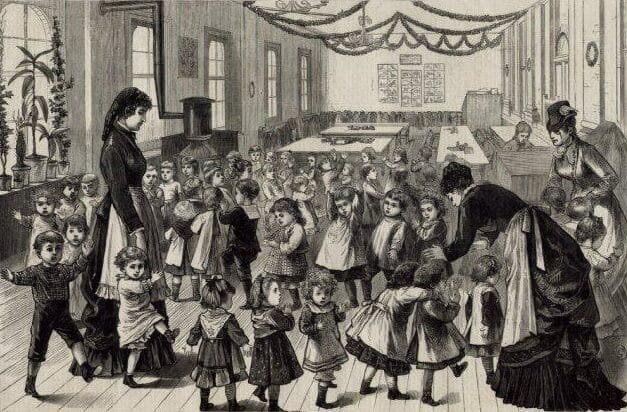Grade School: A Comprehensive Guide to Programs That Foster Knowing and Growth
Grade college plays a crucial role fit a kid's future. It combines essential learning with social-emotional growth. Numerous programs and techniques are utilized to cater to diverse demands. The integration of technology and extracurricular tasks improves the educational experience. Comprehending these components is necessary for promoting growth. What specific strategies can schools apply to ensure every youngster flourishes in this fundamental stage?
Understanding the Value of Very Early Education
While lots of recognize the value of education at any type of phase, recognizing the relevance of very early education is essential for establishing a solid structure for long-lasting discovering. Study indicates that very early youth experiences greatly affect cognitive and social advancement. During these formative years, children are especially responsive to finding out, making it vital to give stimulating and nurturing settings. Quality early education programs cultivate important abilities such as interaction, analytic, and emotional law.
Very early education and learning can link gaps in socio-economic disparities, ensuring all children have access to the sources needed for success. By highlighting play-based knowing and interactive activities, early education and learning grows curiosity and a love for learning. Additionally, it sustains the growth of important assuming abilities that are critical in later scholastic pursuits. Eventually, buying very early education returns substantial lasting advantages, shaping individuals that are much better outfitted for the obstacles of a significantly complicated world.
Typical Curricula: A Tried And True Method
Traditional educational programs have long prioritized core subjects, providing trainees with vital understanding in areas such as language, science, and math arts. This structured learning setting cultivates technique and consistency, making it possible for trainees to concentrate on foundational abilities. Additionally, teacher-led direction plays a crucial function in guiding students with the educational program, making sure that finding out objectives are fulfilled successfully.

Core Topics Emphasis
Although several academic philosophies have actually emerged throughout the years, the emphasis on core subjects within traditional curricula remains a foundation of quality school education and learning. These core subjects generally consist of mathematics, reading, creating, science, and social researches, forming the fundamental knowledge crucial for student advancement. By concentrating on these techniques, standard curricula purpose to gear up students with important assuming skills and a versatile understanding of the world. This organized approach promotes crucial literacy and numeracy abilities, enabling trainees to engage meaningfully with more intricate principles later in their education. The mastery of core subjects is often viewed as an essential sign of academic success, further strengthening their value in grade school discovering atmospheres, and ensuring a regular educational baseline across diverse populaces.
Structured Knowing Atmosphere
An organized understanding atmosphere is vital for fostering academic development in quality institution settings, as it provides a consistent framework within which students can thrive. Standard educational programs frequently emphasize clear expectations, schedules, and routines, permitting pupils to create a complacency and focus on their discovering. This predictability aids lessen diversions and advertises self-control, enabling students to involve extra successfully with academic content. In addition, a structured atmosphere promotes the progressive introduction of intricate concepts, making sure that foundational skills are mastered prior to proceeding. Such a method not only supports cognitive growth but likewise supports social skills, as trainees find out to browse their responsibilities within a defined system. Eventually, an organized knowing atmosphere lays the foundation for long-lasting learning routines.
Teacher-Led Guideline
Teacher-led guideline continues to be a cornerstone of standard educational programs, providing a direct and effective ways of delivering academic material. This method highlights the educator's duty as an authority number and facilitator of expertise, directing trainees with structured lessons and analyses. With an emphasis on direct instruction, teachers can clarify complex ideas, making sure that trainees comprehend fundamental skills crucial for future learning. This approach commonly includes the usage of textbooks, lectures, and specific mentor approaches, which have been shown to generate measurable academic end results. In enhancement, teacher-led instruction cultivates a regimented discovering setting, enabling regular tracking of trainee development. In spite of the appearance of alternate academic methods, the efficiency of teacher-led direction proceeds to be confirmed by its enduring presence in academic setups.

Innovative Technology-Driven Learning Programs
Numerous elementary school are embracing cutting-edge technology-driven learning programs to boost academic outcomes and involve pupils in purposeful methods. These programs leverage tools such as interactive software program, virtual truth, and adaptive understanding platforms, enabling customized discovering experiences tailored to specific pupil demands. By incorporating modern technology right into the educational program, educators can promote cooperation and crucial reasoning skills among pupils.
For instance, coding and robotics courses encourage problem-solving and imagination, while on the internet resources give accessibility to a vast array of information. Additionally, gamified knowing applications make complex subjects much more friendly, motivating trainees to get involved actively in their education.
Educators likewise gain from technology-driven programs with information analytics, which allow for real-time analyses of trainee performance. This enables them to readjust their teaching techniques quickly. On the whole, these ingenious programs are changing conventional educational techniques, preparing trainees for a future where electronic Grade School proficiency is essential.
Extracurricular Activities for Holistic Advancement
Integrating innovation into the instructional landscape has actually opened up brand-new opportunities for pupil involvement, however holistic growth extends past the classroom. Extracurricular tasks play an important role in cultivating all-round growth among elementary school pupils. These activities, varying from arts and sporting activities to clubs and volunteering, supply chances for kids to explore their interests and develop vital life skills.

Engagement in sporting review activities urges teamwork, discipline, and fitness, while imaginative quests promote imagination and self-expression. Academic clubs promote important reasoning and partnership, permitting pupils to use class understanding in real-world contexts. Volunteering instills a sense of community and social duty, enhancing students' understanding of diverse viewpoints.
Social-Emotional Understanding: Structure Durability and Empathy
While academic achievement is essential, social-emotional understanding (SEL) plays a critical duty in nurturing resilience and compassion in elementary school students. SEL programs aim to establish vital abilities such as self-awareness, emotional regulation, and interpersonal interaction, which are essential for pupils' general well-being. By participating in tasks that promote understanding of emotions and social dynamics, trainees find out to browse obstacles and develop healthy and balanced connections.
Integrating SEL right into the educational program fosters a supportive setting where children can share their feelings and discover to feel sorry for others. This strategy not just enhances psychological knowledge yet likewise assists pupils deal with setbacks, promoting resilience. Research study indicates that trainees that take part in SEL initiatives demonstrate improved actions, academic efficiency, and positive peer interactions. As a result, integrating social-emotional understanding right into elementary school programs is necessary for outfitting students with the skills essential for scholastic and personal success, eventually forming compassionate and durable people.
Unique Education Programs: Supporting Diverse Learners
Unique education and learning programs play an important duty in supporting varied students within quality institution settings. Via customized education strategies (IEPs) and inclusive classroom approaches, these programs aim to meet the unique demands of each trainee. Effective implementation promotes an environment where all kids can prosper academically and socially.
Individualized Education And Learning Strategies
Embellished Education Plans (IEPs) function as essential devices in the field of unique education, made to support varied students with special needs. These lawfully binding records outline particular academic objectives, accommodations, and services tailored to each pupil. Developed collaboratively by experts, parents, and instructors, IEPs guarantee that students with disabilities have access to a free appropriate public education (FAPE) This individualized approach promotes significant progression by resolving individual staminas and challenges. Regular assessments and updates to the IEP promote ongoing adjustments, assuring that educational approaches continue to be efficient. Ultimately, IEPs encourage pupils by promoting an inclusive discovering environment that recognizes and values their individuality, enabling them to flourish academically and socially.
Inclusive Classroom Approaches
Creating an inclusive classroom atmosphere is crucial for properly sustaining diverse learners, as it fosters partnership and interaction amongst trainees of varying capabilities (Kindergarten). Comprehensive classroom strategies involve differentiated guideline, where educators adjust lessons to fulfill individual requirements. This might consist of diverse teaching methods, such as aesthetic help, hands-on tasks, and modern technology combination. In addition, advertising peer assistance via cooperative knowing groups motivates trainees to aid one another, improving social skills and empathy. Using universal style principles ensures that all products and evaluations are available. Teachers ought to likewise apply constant routines and clear expectations to create a predictable setting. By prioritizing inclusivity, teachers can grow a favorable ambience that values variety and encourages every trainee to flourish academically and socially
Parental Involvement: Enhancing the Educational Experience
While lots of variables add to a kid's academic success, adult involvement attracts attention as a vital aspect in boosting the general learning experience. Research suggests that youngsters whose moms and dads proactively engage in their education have a tendency to execute better academically and display boosted behavior in institution. This participation can take different kinds, including attending parent-teacher seminars, volunteering in class, or sustaining homework find out this here regimens.
Additionally, efficient communication in between parents and educators fosters a collective atmosphere that benefits pupils. When parents and teachers interact, they can recognize and deal with obstacles much more promptly and properly. Furthermore, adult support motivates children to worth education, instilling a development state of mind that promotes long-lasting learning.
Frequently Asked Inquiries
Just How Can I Choose the Right Elementary School for My Child?
To select the best elementary school, parents should examine scholastic efficiency, extracurricular offerings, instructor credentials, school culture, and place. Looking for and going to institutions feedback from other parents can even more aid in making a notified choice.
What Are the Prices Related To Elementary School Programs?
The costs connected with quality institution programs vary widely, including tuition fees, materials, extracurricular tasks, and transport. Households ought to also take into consideration added costs such as uniforms and potential fundraising contributions for enhanced academic experiences.
How Do Quality Schools Assess Pupil Progression and Efficiency?
Elementary school analyze trainee progression and performance with a combination of standard examinations, instructor assessments, classroom participation, and project-based assignments. Private School. These techniques supply insights into specific discovering, skill development, and general academic success
Exist Options for Homeschooling Within Traditional Elementary School Frameworks?
Yes, numerous conventional grade institutions supply choices for homeschooling via hybrid programs, enabling students to learn at home while joining select institution tasks or classes, providing adaptability and customized education and learning within a structured structure.
What Is the Function of Educators in Fostering Trainee Creative Thinking?
Teachers play an essential role in promoting student imagination by urging expedition, supplying diverse materials, and creating a safe atmosphere for expression. Their assistance motivates trainees to think critically and establish innovative concepts with joint knowing experiences.
A structured knowing setting is essential for promoting academic growth in quality college settings, as it supplies a consistent framework within which trainees can prosper. With a focus on direct guideline, educators can clear up complex concepts, making certain that students understand fundamental skills crucial for future learning. In addition, teacher-led instruction fosters a regimented understanding environment, allowing for consistent tracking of trainee development. Many quality colleges are welcoming cutting-edge technology-driven learning programs to boost academic results and engage pupils in meaningful ways. While academic achievement is vital, social-emotional understanding (SEL) plays a critical role in supporting durability and empathy in grade college trainees.